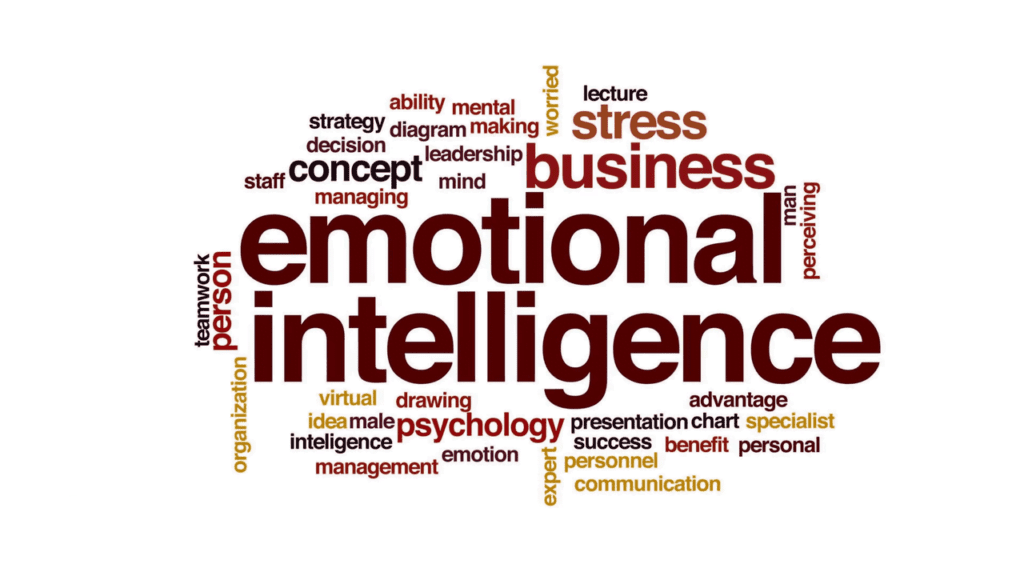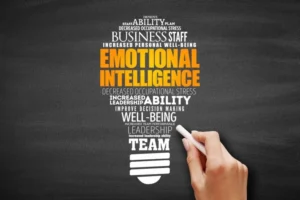The Rise of Emotional Intelligence

In an era marked by constant change and evolving societal norms, Emotional Intelligence (EI) has emerged as a critical determinant of personal and professional triumphs.
Defined by its core components—self-awareness, self-regulation, motivation, empathy, and social skills—EI encapsulates a spectrum of abilities that collectively empower individuals to not only comprehend and manage their own emotions effectively but also to navigate the intricate web of social dynamics.
The recognition of EI as a pivotal factor in the recipe for success has been steadily gaining traction. As the traditional benchmarks of achievement expand to encompass a more holistic view of competence, the understanding that an individual’s ability to engage with and understand emotions plays a decisive role is becoming increasingly evident.
Understanding Emotional Intelligence

At the foundation of Emotional Intelligence lies an individual’s capacity for self-awareness—a deep understanding of one’s own emotions, strengths, weaknesses, and values. This self-awareness, coupled with the ability to regulate one’s emotions in various situations, forms the bedrock of emotional intelligence.
Individuals with a keen sense of emotional self-regulation can effectively manage stress, remain composed under pressure, and make sound decisions even in challenging circumstances.
Motivation, another key component of EI, propels individuals towards their goals with unwavering determination. Unlike traditional motivation, which often stems from external factors, emotional intelligence-driven motivation arises from a deep internal drive and passion.
This intrinsic motivation not only fuels personal growth but also inspires those around, creating a positive ripple effect in both personal and professional spheres.
The Empathic Advantage of Emotional Intelligence

Within the realm of emotional intelligence, empathy emerges as a cornerstone. The ability to understand and share the feelings of others endows individuals with a unique advantage—the Empathic Advantage.
Empathy fosters profound connections, enabling individuals to navigate the complexities of human interactions with finesse.
Those possessing a heightened sense of empathy can establish meaningful collaborations, negotiate conflicts with finesse, and build a harmonious environment in both personal and professional settings.
This empathic advantage extends beyond mere interpersonal dynamics; it assumes a particularly powerful role in leadership.
Emotional Intelligence in Leadership

In the realm of leadership, emotional intelligence emerges as the linchpin that distinguishes good leaders from exceptional ones.
Leaders with a high EI possess a heightened ability to understand and connect with the emotions of their team members. This empathic leadership style contributes to a positive and collaborative work environment, fostering trust and loyalty among team members.
Leaders endowed with emotional intelligence excel in communication, adapting their approach to suit the emotional needs of their team. This adaptability not only enhances the leader’s effectiveness but also sets the stage for the team’s collective success.
The empathic advantage in leadership extends beyond the professional realm, influencing the overall organizational culture and contributing significantly to sustained success.
Emotional Intelligence in Digital Age

The Digital Age introduces a paradoxical scenario where connectivity is abundant, yet the depth of human connection is at risk of being diluted. Emotional Intelligence becomes a beacon in this digital sea, guiding individuals to communicate empathically and authentically across screens.
Moreover, the digital landscape presents challenges related to information overload, online conflicts, and the pressure to curate a perfect online persona. Emotional intelligence equips individuals with the resilience to navigate these challenges, fostering a healthy relationship with technology.
Those with a strong EI are adept at managing digital stressors, maintaining a balanced online presence, and cultivating a positive digital footprint that aligns with their authentic selves.
In the Digital Age, Emotional Intelligence emerges as the compass that not only guides individuals through the intricacies of online interactions but also ensures a harmonious integration of technology into the fabric of their emotional well-being.
Conclusion: The Future of Success in a Connected World

The journey through this exploration of emotional intelligence reveals that the ability to navigate relationships, lead with empathy, and communicate effectively are not mere soft skills; they are the cornerstones of success. The symphony of emotional connection, as discussed in the context of personal relationships, extends its melody to leadership, organizational dynamics, and even the digital realm.
The art of effective communication, conflict resolution, cultivating healthier connections, and building resilience in relationships are not just practices—they are strategies that position individuals for success in a world that thrives on genuine human connection.
In essence, the future of success is intertwined with the mastery of Emotional Intelligence. The Empathic Advantage not only enriches individual lives but also contributes to the creation of a more connected and compassionate world.
As we strive for success in the interconnected tapestry of our lives, let us not overlook the profound impact of emotional intelligence—an ever-relevant guide on the journey towards a more fulfilling and successful future.







